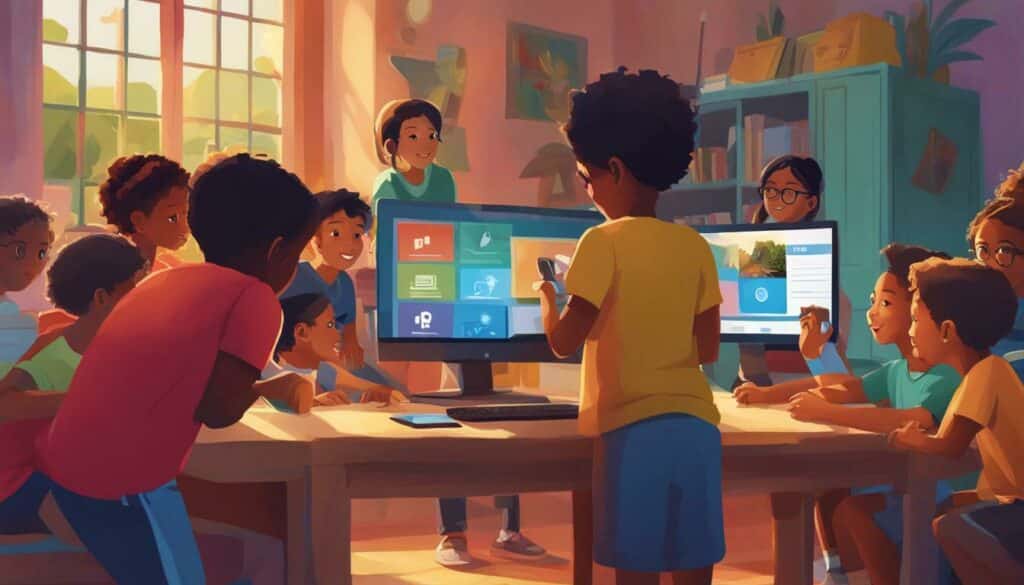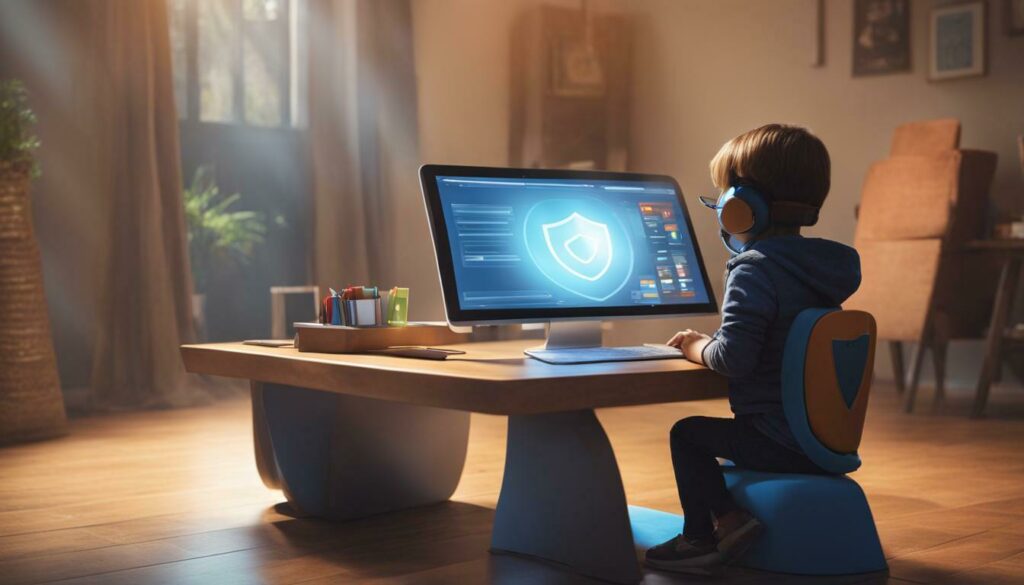In today’s digital age, ensuring your kids are equipped with the necessary skills to protect their personal information is crucial for a secure online future. Online privacy plays a significant role in safeguarding children’s personal information and preventing it from being used for harmful purposes. As a parent, it is important to educate your children about the importance of online privacy and the potential risks they may face in the digital world.
- Teaching children about online privacy and personal information protection is essential in today’s digital world.
- Establishing rules and boundaries helps children understand the importance of safeguarding their personal information.
- Open conversations about online privacy foster awareness and empower children to recognize and respond to potential risks.
- Modeling responsible online behavior sets an example for children to follow and ensures a secure digital experience.
- Using tools like Ghostery can enhance personal information protection by blocking trackers and ads.
Establishing Rules and Boundaries
By setting clear rules and boundaries, you can help your kids develop good habits when it comes to protecting their personal information online. Data security, privacy protection, identity theft prevention, and online safety should be key considerations for every parent in today’s digital age. Teaching children about these important topics can empower them to navigate the online world safely and responsibly.
One effective way to establish rules and boundaries is by teaching children to be cautious about sharing personal information online. Discuss the potential risks associated with sharing sensitive details such as their full name, address, phone number, or school information. Emphasize the importance of only sharing personal information with trusted individuals.
It’s essential to set clear guidelines for what is safe and appropriate online behavior. Create a list of online activities that your child is allowed to engage in, such as social media platforms or online gaming. Discuss the importance of maintaining privacy settings and not accepting friend requests or messages from unknown individuals.
Here are some practical tips to help you establish rules and boundaries:
- Create a family agreement that outlines the rules and expectations regarding online behavior.
- Discuss the potential consequences of not following the established rules.
- Monitor your child’s online activities and consider using parental control software to restrict access to inappropriate content.
- Encourage your child to come to you if they encounter any suspicious or uncomfortable situations online.
Remember, establishing rules and boundaries is an ongoing process. As your child grows and gains more independence online, it’s important to adapt and update these guidelines accordingly. By taking an active role in your child’s online safety, you are equipping them with the necessary tools to protect their personal information and navigate the digital landscape securely.
| Benefits of Establishing Rules and Boundaries | Practical Tips for Parents |
|---|---|
| Protects personal information from unauthorized access | Create a family agreement outlining online behavior guidelines |
| Prevents identity theft and cyberbullying | Discuss potential consequences of not following rules |
| Teaches children to be cautious about sharing personal information | Monitor online activities and use parental control software |
| Promotes responsible online behavior | Encourage open communication about online experiences |
“Teaching children about online privacy and setting clear rules and boundaries is essential in today’s digital world. By establishing guidelines and having open conversations, parents can empower their kids to protect their personal information and navigate the online landscape safely.”
Open Conversations about Online Privacy
Open conversations about online privacy are vital to empower your kids with the knowledge and skills necessary to navigate the digital world safely. As a parent, it’s important to talk to your children about cybersecurity, data privacy, privacy settings, and safety measures. By having these conversations, you can help them understand the risks associated with sharing personal information and teach them how to protect themselves online.
One way to initiate these conversations is by discussing real-life examples of privacy breaches or scams that have occurred. This can help your children understand the potential dangers they may face and encourage them to be more cautious about the information they share online. By openly discussing these incidents, you can also address any concerns or questions they may have.
Another important aspect of open conversations about online privacy is teaching your children about privacy settings and safety measures. Show them how to adjust the privacy settings on their social media accounts, explain the importance of using strong and unique passwords for each online account, and discuss the risks of interacting with strangers online. By equipping them with this knowledge, you can empower them to take control of their own digital footprint.
| Benefits of Open Conversations about Online Privacy: |
|---|
| 1. Increased awareness of online privacy risks |
| 2. Empowerment to make informed decisions about online activities |
| 3. Ability to recognize potential privacy threats and respond appropriately |
| 4. Development of critical thinking and problem-solving skills |
Remember, open conversations about online privacy should be ongoing and age-appropriate. As your children grow older, continue to discuss new privacy concerns and offer guidance on navigating the ever-evolving digital landscape. By establishing a strong foundation of knowledge and trust, you can help your children develop responsible online behaviors that will serve them well throughout their lives.

As a parent, you play a crucial role in setting an example for your kids by practicing responsible online behavior. By demonstrating good habits, you can teach your children about data breach prevention, information security, and secure online browsing. Here are some practical tips to help you model responsible online behavior:
- Use strong and unique passwords for your online accounts. Encourage your children to do the same and explain the importance of password security.
- Regularly update your devices, software, and apps to ensure you have the latest security patches and features.
- Be cautious about the information you share online, both in public posts and private messages. Remind your children that once something is shared online, it can be difficult to fully erase.

Teaching your children about data breach prevention and information security is essential in today’s digital age. By modeling responsible online behavior, you can instill in them the importance of staying safe and protecting their personal information.
In addition to these tips, it’s essential to educate your children about secure online browsing. Teach them about the risks of clicking on suspicious links or downloading files from untrustworthy sources. Encourage them to verify the credibility of websites before entering personal information.
By modeling responsible online behavior, you not only protect yourself but also empower your children to navigate the online world safely and responsibly. Remember, your actions speak louder than words when it comes to teaching your kids about data breach prevention and information security.
| Benefits of Modeling Responsible Online Behavior |
|---|
| 1. Protection against cyber threats: By practicing secure online browsing habits, you reduce the risk of falling victim to cybercriminals and hackers who may attempt to steal your personal information. |
| 2. Enhanced privacy: When you model responsible online behavior, you teach your children to protect their privacy by being mindful of the information they share online and taking necessary measures such as adjusting privacy settings. |
| 3. Building trust: By demonstrating responsible online behavior, you build trust with your children. They will feel more comfortable coming to you with any concerns or questions they may have about online safety. |
Using Tools for Personal Information Protection
Utilizing tools like Ghostery can provide an additional layer of protection for your child’s online privacy. In today’s digital world, it is crucial to educate kids about protecting their personal information. Online privacy is vital as their data can be used for harmful purposes.
As a parent, you can teach your child about online privacy by establishing rules and boundaries. Make them aware of the risks associated with sharing personal information online and set clear guidelines for what is safe and appropriate. By doing so, you can help prevent data security breaches and protect their privacy.
Open conversations about online privacy are also important. Talk to your child about potential privacy risks and teach them how to recognize and respond to them. Encourage them to ask questions and provide guidance on privacy settings and safety measures. Creating an environment of trust and awareness will empower your child to navigate the online world safely.
In addition to establishing rules and having open conversations, it is crucial to model responsible online behavior for your child. Show them the importance of practicing secure online browsing and understanding the risks of data breaches. By taking necessary measures to ensure information security, you can set a positive example for your child and instill good online habits.
Utilizing tools like Ghostery can enhance your child’s online privacy. This browser extension blocks trackers, ads, and malvertising, protecting their personal information from being accessed by unauthorized sources. By implementing such tools effectively, you can safeguard your child’s online presence and give them a confident and secure digital future.
FAQ
Q: Why is educating kids on protecting their personal information important?
A: Educating kids on protecting their personal information is crucial in today’s digital world. Online privacy is important for children as their personal information and data can be used for harmful purposes.
Q: How can parents teach their kids about online privacy?
A: Parents can teach their kids about online privacy by establishing rules and boundaries, starting open conversations, and modeling responsible online behavior.
Q: What are some practical tips for establishing rules and boundaries?
A: Parents should teach children about the risks of sharing personal information, recognize potential privacy risks, and use privacy settings and safety measures.
Q: How can parents initiate open conversations about online privacy?
A: Parents can initiate open conversations about online privacy by discussing potential privacy risks and teaching children how to recognize and respond to them.
Q: What is the importance of modeling responsible online behavior?
A: Modeling responsible online behavior is important for parents to ensure data breach prevention, information security, and secure online browsing. Parents should lead by example.
Q: How can tools like Ghostery protect children’s online privacy?
A: Ghostery, a browser extension, can help protect children’s online privacy by blocking trackers, ads, and malvertising. It can be an effective tool for personal information protection.